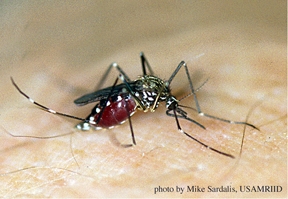Feb 9, 2012

(Photo by Mike Sardalis, United States Army Medical Research Institute for Infectious Diseases.)
It's an Asian species "generally found in Japan, Korea, the Ryukyu Archipelago (Okinawa and associated islands), Taiwan, South China, and Hong Kong," according to the Centers for Disease Control and Prevention (CDC).
It was first detected in the United States in 1998, collected on Long Island, N.Y. and in Ocean County, N.J.
In a little over a decade, this little known mosquito has spread to 28 U.S. states, several Canadian provinces, with additional introductions discovered in Washington State, Oregon, Hawaii, Germany, France, and New Zealand, says Jamesina "Jamie" J. Scott, district manager and research director, Lake County Vector Control District
Scott, who has a doctorate in entomology from Rutgers, will be speaking on "Aedes japonicus-- Tracking an Invasive Mosquito We Knew Very Little About" at the next UC Davis Department of Entomology seminar, set for Wednesday, Feb. 15 from 12:10 to 1 p.m., 122 Briggs Hall.
Her seminar should draw a widespread crowd.
"Before its detection in the United States in 1998, fewer than a dozen scientific publications existed that even mentioned Aedes japonicus," Scott says. Although laboratory studies have shown that it is "a competent vector of Japanese encephalitis and Getah viruses (Takashima and Hashimoto 1985, Takashima and Rosen 1989), there was little interest in this species within its native range because it did not play a major role in disease transmission, and rarely was present in populations large enough to pose a pest problem."
"Interest in the biology of this mosquito," Scott says, "has increased with its recent introductions around the world, its ability to transmit West Nile virus and St. Louis encephalitis viruses" and its willingness to bite humans.
Why study this particular mosquito? "The opportunity to track an invading vector species provides many opportunities to investigate its ecology, competition with other native and introduced mosquitoes, and new roles in the transmission of native and introduced viruses."
Host will be Brittany Nelms, a doctoral candidate in William Reisen's lab (Center for Vectorborne Diseases/UC Davis Department of Entomology. "It's going to be a fascinating talk," Nelms said.
Attached Images:

Jamesina Scott at work. (Photo by Dave Woodward)

Aedes japonicus (Photo by Ary Farajollahi)